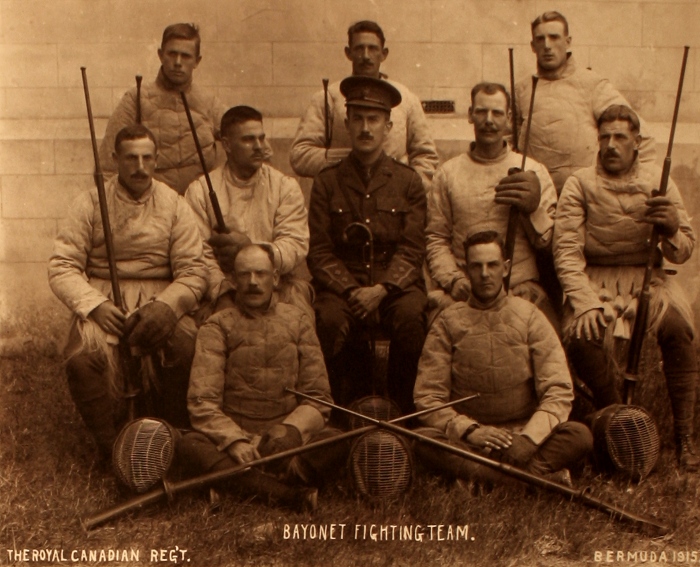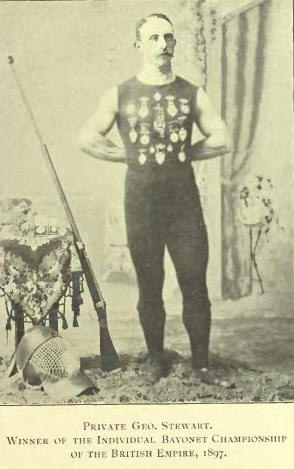Topic: Canadian Militia

This photo, which shows the bayonet fighting team of The Royal Canadian Regiment in Bermuda (1915) illustates the seriousness with which this was taken as a military sport. Note the padded suits and protective helmets, and the training rifles with blunt tipped "bayonet" extensions.
48th Highlanders Bayonet Fighting Champion
Daily Mail and Empire; 19 June 1897
Newspapers all over the Dominion have been referring to the great success of the 48th Highlanders at the Royal Military tournament in London, as the following from the Montreal Witness shows:—

Private George Stewart; Winner of the Individual Bayonet Championship of the British Empire, 1897. (Source)
Canada has certainly to thank Toronto and the officers of the 48th Highlanders for the honour she has won by the skill of the team sent by them to compete in the Royal Military tournament, where British regulars, irregulars, and volunteers, white and coloured, from all over the Empire meet in friendly combat. Toronto's Highlanders bayonet team easily defeated all colonial teams in the bayonet trials, and four Canadians were left to compete for the for the colonial prize. Then they defeated the British regulars apparently only with less ease, and then overcame the team of picked men from the Household troops, drawn from the Life Guards, the Grenadier Guards, and Scots Guards. Finally, the most skillful of the Canadian team, Private Stewart, won the Empire prize against all victors in previous contests, and is therefore the British Empire champion. Toronto intends to give Private Stewart a public welcome when he returns; if he lands from his steamer in Montreal our volunteers should see to it that he and the rest of the team do not step on shore without three hearty cheers in their honour.
It is about time the matter was taken up by the city, and preparations begun for a right royal reception. Hayhurst, after he won the Queen's prize, was given a reception in Toronto, while in Hamilton he owned the town for the time being. Shall we be behind Hamilton in doing honour to Stewart and the rest of the team? Hayhurst was given a Government position, and the present Government should do as much for Stewart, who needs it perhaps worst that Hayhurst did, and who had brought as much glory to Canada as the Queen's prize-man did. All the 48th team learned their bayonet fighting right in Toronto, the results being due to Canadian training, not Scotch. The greatest credit is due Sergt. Williams, the instructor, and if there is to be any substantial recognition of their services by the citizens Sergt. Williams and Pte. Stewart should be bracketed together.

"An event which will go down in the annals of the Forty-Eighth Highlanders is the victory of the regimental team at the Islington Royal Military Tournament. The tournament, which is a military function of the highest importance, took place in June, 1897, and a team from the Forty-Eighth decided to cross the ocean to take part. It was a bold venture, but Sergt. Williams and his men felt confident that they would win honour for the Regiment. Great public interest was aroused by the event. The citizens of Toronto, the City Council, and the Ontario Government subscribed handsomely to the fund required to cover the expenses of the trip. The ten members of the team were: Sergt.-Instructor Williams, "H" Co., in command, Pte. Rankin and Pte. McCheyne, "A" Co., Pte. Campbell and Pte. Rae, "E" Co., Pte. Wallbridge and Pte. DeLisle, "G" Co., Pte. Stewart, Pte. I. McLean and Pte. Wasson, "H" Co. The team was accompanied by Major Wilbur Henderson, "H" Co. The contests were with bayonets, and though the Highlanders were in excellent form, few Canadians expected the victory would have been so complete and glorious. The Highlanders won in three contests."

